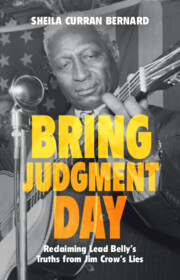
- Publisher:
- Cambridge University Press
- Online publication date:
- June 2024
- Print publication year:
- 2024
- Online ISBN:
- 9781009103619

Known worldwide as Lead Belly, Huddie Ledbetter (1889–1949) is an American icon whose influence on modern music was tremendous – as was, according to legend, the temper that landed him in two of the South's most brutal prisons, while his immense talent twice won him pardons. But, as this deeply researched book shows, these stories were shaped by the white folklorists who 'discovered' Lead Belly and, along with reporters, recording executives, and radio and film producers, introduced him to audiences beyond the South. Through a revelatory examination of arrest, trial, and prison records; sharecropping reports; oral histories; newspaper articles; and more, author Sheila Curran Bernard replaces myth with fact, offering a stunning indictment of systemic racism in the Jim Crow era of the United States and the power of narrative to erase and distort the past.
Finalist, 2025 Award - Biography/Autobiography, Jazz Journalists Association
‘Sheila Curran Bernard rescues the legendary ‘Lead Belly’ from a swirl of fabrication and racist presumption, and simultaneously illuminates the systemized oppression that cruelly stalked Black artists and ensured, for a century after the ostensible end of slavery, that bitter chords of racial injustice would remain as central to the American chorus as any melodies of freedom.’
Douglas A. Blackmon - author of Slavery by Another Name: The Re-Enslavement of Black Americans from the Civil War to World War II, Winner of the Pulitzer Prize
‘Sheila Curran Bernard’s thoroughly researched book is necessary for recuperating and rescuing the truth of Huddie Ledbetter from racist myths and stereotypes, but also for recasting deeply held myths and assumptions about white paternalism and the origins of American folk music.’
Mary Ellen Curtin - author of Black Prisoners and Their World, Alabama, 1865–1900
‘A beautiful tribute to Lead Belly’s legacy. This book will forever change the way we think about one of America’s most iconic musical legends and one of its most misunderstood.’
Talitha L. LeFlouria - author of Chained in Silence: Black Women and Convict Labor in the New South
‘Sheila Curran Bernard is the first to give us a biographical book on Huddie Ledbetter as he really was: a complicated man tactically negotiating a complex, racist, and overwhelmingly unforgiving world.’
Gustavus Stadler - author of Woody Guthrie: An Intimate Life
‘Bernard's valiant and impressively researched book is an attempt to reclaim Ledbetter from an implicitly racist narrative. Through close examination of arrest, trial and prison records, sharecropping reports, newspaper articles and oral histories contextualised by a deep understanding of American civil-rights history, she demonstrates how Ledbetter was far from a career criminal, but rather a victim of successive injustices and appalling conflicts of interest in a brutal system explicitly designed to provide enslaved work-forces and deny black rights in the post-reconstruction Southern states…. It isn't hard to draw a line from the public fear and fascination with Lead Belly to the gangsta rap controversies of more recent times. Bring Judgement Day is an overdue redress.’
Neil McCormick Source: Sunday Telegraph
‘A revelatory volume that rescues its subject from misconceptions that still circulate, enabling us to see more clearly a composer and performer who was the peer of Blind Lemon Jefferson and Bessie Smith.’
Duncan Wu Source: The Spectator
‘The portrait that emerges is of a man who defined himself as ‘a musician, song composer and a dancer’ and whose legacy deserves better than the demeaning characterization that’s persisted for decades. Essential for musicologists and fans of folk music.'
Source: Kirkus Reviews
‘[A] new and vitally important biographical study…. Lead Belly has, in many ways, remained hidden in the shadows behind myths, half-truths, and, in some cases, willful misrepresentations of him, his times, and his cultural and social significance as a Black musician in an America still rent by ‘Jim Crow’s lies.’…. Sheila Curran Bernard has exhumed this narrative and reexamined it, exposing (or, more accurately, insisting on acknowledging) the contradictions that have long compromised it.'
David Whiteis Source: Living Blues
 Loading metrics...
Loading metrics...
* Views captured on Cambridge Core between #date#. This data will be updated every 24 hours.
Usage data cannot currently be displayed.